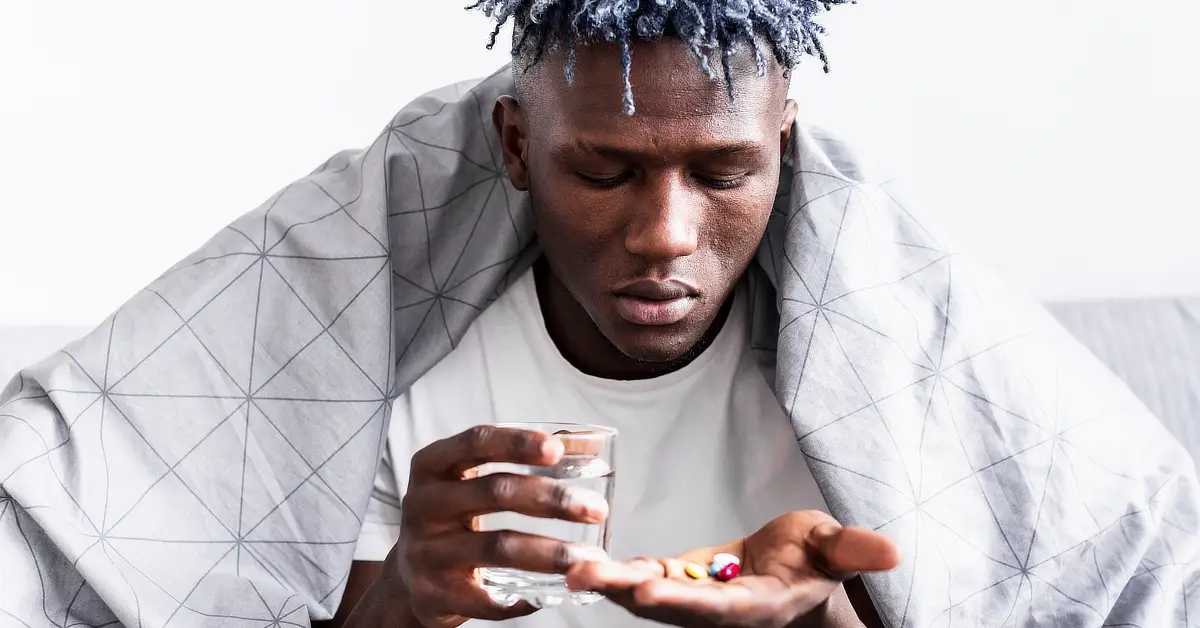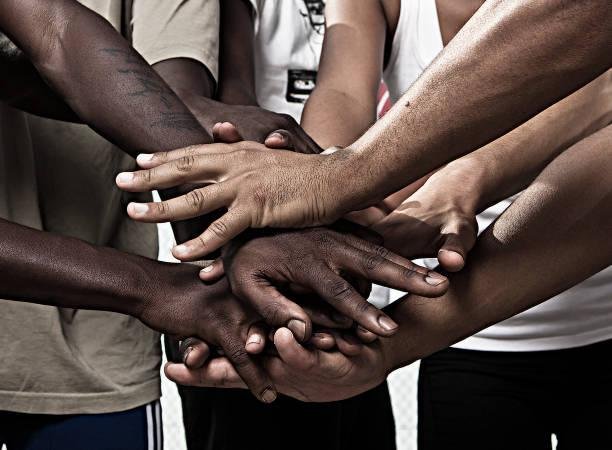Features
Over the counter

In Sikaman, I can bet that almost everybody you see is either a doctor or a pharmacist. If you’re sick, you don’t need to go to the hospital to see a doctor. Just see a friend and tell him your problem. “I have strong headache, bodily pains and loss of appetite.”
Your friend will look into your face and prophesy that you’re also suffering from constipation. Probably your nose looks like that of a chronic ‘constipator’.
“I can’t go to toilet”, you’d readily confirm.
“Don’t worry. Go and buy Chloroquine, four tablets, take two in the morning after koko and two in the evening. Also buy WL; if your stomach is hard take three, otherwise take two. Don’t forget and take four. Also don’t take it and go and board a bus to Kumasi or else you’ll set a national record.
See another friend with the same problem and he’d tell you to go and get Alagbin. “If there is no Alagbin, buy Drastin or Top Tabs. The malaria will go like water.
Meet yet another friend and he is likely to tell you, “Go and buy abom belt (terramycin or ampicillin). Take two straight. Wait for thirty minutes and balance it with three tots of raw akpeteshie. The fever will go long time. Me, this is how I cure my fever-o! Me I’ll never go to hospital and a nurse will be pricking my buttocks with a needle. I am not a fool”.
Somehow, all the four prescriptions by the unorthodox medical practitioners are effective but only to some extent. They can mask the disease called malaria and the patient will experience a sense of relief, but a relapse is inevitable.
In fact, if you’re sick of malaria and you ‘check’ a quarter of bitters, you’ll start sweating like a dock worker. Sweat will burst Alomele forth all over the body and will finally create an air-conditioner in the armpit, a sort of natural cooling system one can always rely upon.
The effect of this local alcohol which surpasses Russian Vodka in international status and ability to turn the human eye, will make you feel the malaria has been evicted from your system. In due course, you certainly will come to appreciate the fact that peters is not a cure for malaria.
From 6.30 p.m., go from one drugstore to another and you’ll see many people buying drugs over the counter. Only about five per cent of them buy with doctors’ prescription.
The rest are self-made, self-promoted doctors and pharmacists who buy butazolidin, malarex, chloroquine, phensic, baralgin, valium, cafenol, kaolin, anusol, chloramphenicol, anacin and many others by their own prescriptions.
Even you can buy syringes over the counter and that is why some herbalists are going about injecting anybody they see. In the process they distribute tetanus free of charge. They are very generous!
We are all guilty of self-medication including me Kwame Alomele. I don’t often cure my malaria by going to the doctor when I know I am also a doctor. The only difference is that I’ve not been to the medical school and sworn the Hippocratic Oath.
Although I realise that self-medication is bad, I’m compelled to do it because it saves me time. Kokotako says he self-medicates because it saves him from the wrath of private doctors who always want to empty his back pocket.
In developed countries over-the-counter drug purchases are forbidden. The druggist may sell you some pain killers and condoms if you want to have a showdown with your fiancée.
But to go to a pharmacist and say you want to buy Indocid without a doctor’s prescription is unheard of, and of course, you’d be given the marching off orders.
Self-medication is a form of drug abuse which must not be encouraged. This form of abuse is common in third world countries because families do not have their own doctors.
Ideally every family is supposed to have a family doctor who comes around periodically to examine the members, offer treatment and advice.
Any ailment is first relayed to him by phone and he gives appropriate advice. He is paid a regular fee, for these services. In Sikaman, only about one per cent of the population can afford the services of a family doctor. The money that would be used to pay the family doctor a week would be of better service if used to prepare groundnut soup that would last some three days.
So in the absence of the family doctor, many act in his stead and do their own by diagnoses, give their own prescriptions often by trial and error and risk wrong medication, under-doses, over-doses. After all, “All die be die”.
Perhaps if health services could be cheaply sought, self-medication will reduce. This brings to mind the idea of the National Health Insurance Scheme and its advantages. Certain diseases like heart ailment that need surgery to correct require between Gh¢ six and 10 million in terms of cost.
The Weekly Spectator has had to launch appeals for funds for those who need money to cure medical conditions including Hole-In-Heart. Some of these appeals will not be necessary if a National Health Insurance Scheme is in place to which anybody who values his health and life could contribute to and benefit therefrom.
This will also reduce the incidence of self-medication because your health needs will always be catered for whether you are suffering from kooko or stubborn constipation.
Perhaps, we’d want to know why the scheme is still not in place!
This article was first published on Saturday, October 15, 1994
Join our WhatsApp Channel now!
https://whatsapp.com/channel/0029VbBElzjInlqHhl1aTU2
Features
The wonders of love…

A haircut I had about a week ago didn’t go down well with many. Someone quite close to my heart saw it, examined it critically and felt dizzy.
“What’s this?” she proceeded to ask me.
“An international hairdo,” I replied.
She was disgusted, in fact disappointed. The problem with the haircut is that the style is neither Punk, Tokyo Joe nor Show Your Back. If anything, it is a combination of all—and I liked it, for a change.
It was when I bounded downtown that someone called me and enquired whether I was no longer a journalist. He said I looked like a well-fed Warrant Officer.
“Class One or Class Two?” I asked.
Another studied my head as if he was studying physical geography and pronounced that I looked like a boxer who can throw dangerous punches. Still, someone was of the opinion that the haircut didn’t quite fit me, but admitted that I looked like a prosperous merchant.
Commendation
I remember some three months ago, I had a haircut that made two girls fall in love with me. In spite of the fact that the barber was not a graduate, the cut was such that they couldn’t help admiring it. One of them actually ‘checked out’ the style and commended the barber.
The other was more bent on the ‘love matter’ but I was too busy to give her any attention. LOVE!
I was reminded of this when I viewed a premier showing of the latest Sikaman film titled THE POWER OF LOVE. The film kept me thinking. Some of us have long forgotten about what it is like to be head-over-heels in love. When we were students, we had such experiences because there was nothing doing anyway.
We were either learning how stylishly to smoke ‘jot’ or how romantically to fall in love. Anyhow, I was intrigued by this latest movie because of the way love unlimited was portrayed on screen. It took my memory back many years to relive those youthful days when we felt we’d really die if jilted by our lovers.
The storyline of THE POWER OF LOVE is really an exciting one. The combination of love, treachery and intrigue made me feast my eyes intently on the screen, unbelieving the extent the force of love can reach.
Ama and Afua are good friends. But when it comes to matters of the heart, they have different tastes; Ama is content with only her boyfriend (a student) and Afua samples the bigwigs around town. Afua, not satisfied with the shots in town, wants Ama’s boyfriend Joe in addition. She lies to Joe that Ama has often been picked by a man on four-wheels, whereupon Joe dismisses Ama and takes on Afua.
Ama doesn’t realise that it is her best friend Afua who is destroying her relationship with Joe until she catches her having sex with him. She collapses and goes out of her mind from the broken heart. But before then, she had been made pregnant by Joe.
Having escaped from a psychiatric hospital, she roams town murmuring Joe’s name. Heavily pregnant now, she espies Joe boarding a mini bus and runs towards him. Joe, seeing her approaching, quickly disembarks and takes off.
Ama pursues him furiously, and he runs to his home where he finds his bosom friend Frank making love to Afua. He immediately realises the treachery of Afua who instigated him to leave Ama.
He intends leaving the home in disgust and meets mad Ama at the door and embraces her despite her madness. Instantly, she regains her sanity.
Love indeed heals the wounds of the mind and it is the greatest positive force in the world. Incidentally, the greatest negative force is hatred.
Greatest force
Now coming to talk about love, I reiterate it is the greatest force imaginable. That is why a man will butcher his rival to death if he catches him climbing his wife without asking permission; and a woman will go mad if jilted.
It is also for this reason that a young boy who is scared stiff of cemeteries and under normal circumstances would not dare go near one, will this time walk boldly through a cemetery at midnight if that is the only way to his lover’s abode.
The Bible describes love for our neighbours as the surest way to heaven: Love thy neighbour as thyself.
Unfortunately, what Ghanaians are more interested and skilful in is loving the opposite sex. Romance under the cover of darkness is what we understand love to be all about. When it comes to loving our fellow human beings, we are found wanting.
People hate others just because they are of another tribe and do not speak the same native language. Too much grudge-bearing that does not augur well for national development.
War in Liberia, carnage in Rwanda are the results of the absence of love for one’s fellow being. If everybody could express a little bit of love for his fellow being irrespective of tribe, race, politics or religion, Sikaman—and indeed, the world—will be a more habitable place.
This article was first published on Saturday, October 29, 1994
Join our WhatsApp Channel now!
https://whatsapp.com/channel/0029VbBElzjInlqHhl1aTU27
Features
Monsieur’s daughter – (Part 7)
“Sir,” Ms. Odame said when David Asante answered the call, “my name is Victoria Odame. I’m a teacher at Research School in Koforidua. I would like to come and see you concerning a student called Sarah.”
“Okay, madam. I would be very glad to meet you. How can I make your trip easier?”
“I was going to join a bus to Accra.”
“Here’s what we will do. Take a taxi and ask them to bring you to Accra. I will speak to the driver, give him the directions, and pay him when you get here.”
The taxi stopped in front of the house. The gate opened, and the driver moved to the long driveway and stopped.
“What a beautiful house,” he said.
David and Adoma came out to meet them. Adoma paid the driver as David and Sarah stared at each other.
“Please come in and sit down,” Adoma invited. She served them water.
“You are welcome,” Adoma continued. “We have been waiting anxiously since you called this morning. So please, let’s hear you.”
Before she could open her mouth, Sarah rose, moved to David, hugged him, and sat on his lap. They both broke into tears. Adoma and Ms. Odame also broke into tears.
“Sorry, madam,” David said. “This whole episode has been a very difficult one. But let’s do the proper thing. Let’s hear you first, and I will also speak. I’m sure we need to answer some questions immediately.”
“Okay, sir. I have been taking an interest in Sarah because, although she’s brilliant academically, she seemed to be troubled. Following my discussions with her and some whispers I had been hearing, I went to Aboso Senior High School and spoke to your former colleague, Mr. Hanson. He told me that you were an exemplary teacher who was loved by all, and he also told me about the unfortunate events that caused you to leave for Germany. So I returned to Koforidua with the view to finding the appropriate means of helping to solve this problem.”
“Great. Ms. Odame, I have to thank you for finally helping us to solve this problem. Now, let me state the facts. This is what happened.
“Gladys and I met and got married whilst we were both teachers in the school. Some months into our marriage, she told me that she needed to spend some days with her parents, and I agreed.
“It turned out that she was actually spending time in a hotel with her ex-boyfriend, Simon. This happened again after Sarah was born. I got wind of this and told her that I was no longer interested in the marriage.
“I started preparing to travel to Germany. She pleaded for forgiveness, but I stood my ground. Then she told me that she would punish me for rejecting her.
“She came out later to say that Sarah was not my child, but Simon’s. She went and hid her somewhere, obviously expecting that I would fight to take my child. I was actually going to do that, but my parents advised me that it was almost impossible to win such a fight.
“They advised that, difficult as it sounded, I should leave the child with her because she would come back to me eventually. I have absolutely no problem taking care of you, Sarah. I am taking care of quite a number of kids who are not mine. So that is what happened. My hands were tied. I have been trying to find out how you are doing.
“I kept hearing that you were doing well at school. I also heard that Gladys and her husband were having problems, but I kept hoping that my daughter would at least be okay till it was possible for me to go for her.”
“Sarah, now you have met your dad. You will be free to—”
“I’m not going anywhere!” she declared as she held on to him.
“You don’t have to worry about that, Sarah,” Adoma said. “We have been looking forward to the day you come home. This is your home. Now, you have to meet your siblings.” She called Abrefi and Adaawa.
“Girls, we told you that you have a sister who would join us anytime. Now here she is.”
“Sarah?” Abrefi asked.
“Yes,” Adoma replied. The girls hugged her and took her away.
“Now,” David said, “I think it is time to call Madam Gladys.” He dialed the number.
“My name is David Asante. I’m here in my house with my daughter Sarah. I hear you have told her all sorts of crazy stories about me. I could make life very difficult for you, but I won’t.
“You are your own worst enemy. I don’t think you should be expecting her anytime soon. What do you say?”
Gladys stayed silent for over a minute, then cut the line.
“Food is ready,” Adoma announced. “Everybody, please come to the table.”
Sarah chatted excitedly with her siblings as Adoma and David spoke with Ms. Odame. She kept staring at her father.
“Now, Ms. Odame, after you have brought such joy into our home, should we allow you to go back to Koforidua today, or should we wait till we are ready to release you? I could call your husband and ask permission.
“And please don’t tell me you didn’t bring anything for an overnight stay. There are several supermarkets around here. We can fix that problem quickly.”
“I will beg you to release me. Now that I have been so warmly welcomed here, I already feel part of this home. Koforidua is not that far away, so I will visit often.”
“Well, let’s see what the kids have to say. Ladies, shall I release Ms. Odame to go back to Koforidua?”
“No!” they shouted, and all broke into laughter.
“Ms. Odame, I will have mercy on you. But we are going to do something to make it easy for you to visit us. My wife wants to show you something. Please follow her.”
Adoma led her to the driveway as the others followed. They stopped in front of the car.
“This is a Toyota Corolla 1600. It is very reliable and good on petrol consumption. We are giving this to you in appreciation of your help in getting our daughter back to us.
“And here in this envelope is a little contribution to help you with maintenance. And here in this other envelope is a gift to help with your children’s school fees.”
As she stood, stunned, and stared from the car to the envelopes, David put his hand around his family.
“Let’s leave her to take a look at her car. Ms. Odame, one of my drivers will drive you to Koforidua and leave your car with you. We are waiting inside.”
By Ekow de Heer














